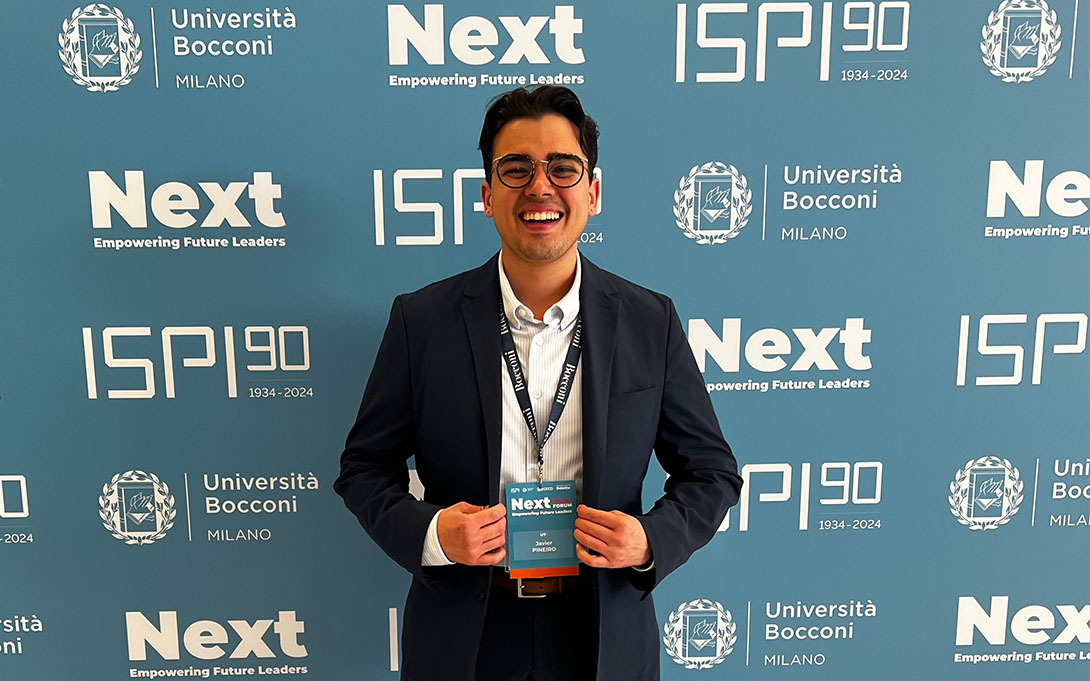
I don't think if you had told me when I was a teenager growing up in a very rural small town in Puerto Rico that one day, still being young and a student, I would be in a position to go to a conference abroad and meet with people from all over the world and be part of a policy proposal process.”
Javi Piñeiro (MPP/JD’24) was one of two students who comprised the U-M delegation for the U7+ Alliance, a coalition of universities in G7 countries and beyond that provide educational insight to G7 leadership, at the annual Next Milan Forum last month. The two-day international event in Milan, convenes future leaders to debate and share policy proposals with the global community. Piñeiro was chosen for their exceptional student leadership and previous experience representing the University of Michigan internationally at the 2022 UN Climate Conference, COP 27. The event was organized by the Italian Institute for International Political Studies (ISPI), the Organization for Economic and Cooperation Development (OECD), and Bocconi University, which also hosted the event.
Can you explain your role at the Next Milan forum and your connection to G7?
Javi Piñeiro: The Next Milan Forum gathers diverse groups of young leaders from around the world, and one of those groups that was invited was the U7 Student Leaders group. The U7 Student Leaders group was tasked with developing policy proposals for the presidents of the universities—who will meet in April—to offer a student perspective on what priorities and proposals the G7 will receive this year.
What were your days at the forum like?
JP: This year, the forum focused on climate change and higher education. The two days I spent at the forum were split between a closed-door morning session for the U7+ Student Leaders group and a larger afternoon plenary session for groups to exchange ideas. The morning session also featured guest speakers who spoke about different policy initiatives happening in G7 universities and countries.
What were the policy recommendations your group made?
JP: Related to climate change, we proposed including a curriculum that incorporates and integrates climate change into academic offerings. We also suggested having more climate-forward policies on college campuses: increased waste management efforts, recycling, decreasing food waste, and energy-efficient public transportation. These were included in building a sustainable model for a university that is not only climate-conscious but climate forward.
We also made recommendations related to higher education, focused on how to increase diversity and the quality of instruction for students entering colleges and universities. We also made a recommendation to ensure students have support systems and communities inside academic programs so that they can succeed, and consequently, there is a more diverse pool for the next generation of academic scholars.
How did the Ford School prepare you for this opportunity?
JP: Both my education at the Ford School and the law school tremendously prepared me for the experience in Milan. The Ford School’s Integrated Policy Exercise (IPE), a three-day simulation that allows first year MPP students to engage with policy experts under real-world constraints, was a key component of my preparation. Additionally, the introduction course, PubPol 555, helped me understand and visualize the U7 group’s role within the policy process.
What will you take away from this experience?
JP: Attending the Next Milan forum was a memorable finale to an enriching educational career at U-M and a moment of reflection for me. Higher education has been the key component of how I’ve grown and transformed. Having access to a university like the University of Michigan has been tremendously transformative for me, and one of the most concrete examples is attending a conference like this. I don’t think if you had told me when I was a teenager growing up in a very rural small town in Puerto Rico that one day, still being young and a student, be in a position to go to a conference abroad and meet with people from all over the world and be part of a policy proposal process. So it’s only because I’ve been able to access higher education that I’ve been able to do these things, and a key component of that is the MPP program. When I started the MPP, I was unsure if I wanted to focus on fiscal and monetary policy because of my background in economics and accounting or to go more into the climate change space. I think during the MPP, I developed more awareness of global issues, particularly related to climate change and how the climate crisis requires more robust sustainable financing.
What are you planning to do next?
JP: Upon graduating from Michigan next month, I am joining the tax team at a global law firm in Chicago, and I hope to develop a career that integrates taxes and sustainable development. There’s an opportunity now, thanks to the Infrastructure Bill, to get into this niche practice of tax for energy projects and renewable energy development. So I want to explore that area and see if I can develop expertise in that field.
About the Next Milan Forum and the U7+ Alliance
The annual Next Milan Forum gathers diverse groups of students from around the world. The student insights and recommendations help inform the U7+ Summit, which gathers the presidents from each university in the U7+ Alliance to discuss and share the most pressing issues in higher education for the G7 forum. The University of Michigan represents the United States U7 delegation, as well as UCLA, Georgetown University, and Northwestern University. The U7+ Student Leaders group comprised about 45 students, while the Next Milan Forum gathered over 1,000 student leaders worldwide.
Written by: Olivia Davis
More news from the Ford School